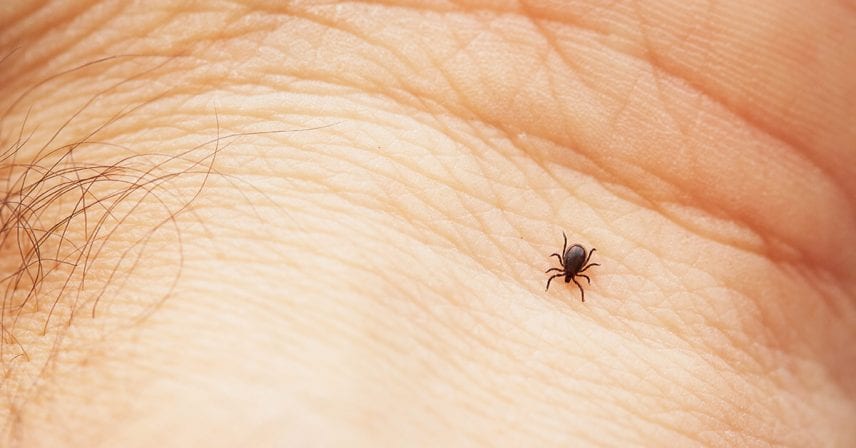Ticks are considered arachnids which places them in the same family as spiders. And like spiders, they can be poisonous to humans. Unlike spiders, however, ticks are classified differently based on their method of consumption. They are considered ectoparasites because they attach themselves to the exterior of a host’s body and draw nutrients from the host’s blood. Additionally, there are two kinds of ticks: Those characterized by soft exteriors and those characterized by hard exteriors.
During the winter months, ticks go into hibernation or simply cling to warm-blooded hosts. So you’re not out of the woods (so to speak) just because it’s cold outside.
What Do Ticks Do in the Winter Months?
Like most of us, ticks try to keep warm in winter. This means looking for a warm place to hunker down during the cold months. Typically, some fall leaves will do the trick, but there’s no reason that a home wouldn’t work either. If ticks sense that it is more than 45℉, they will go out looking for something to do.
In addition to finding a warm place to go, ticks can also latch onto a host that will provide it with the warmth it needs. The tick can outlast the winter and still have a source of food during those months.
What about the Lyme Disease Ticks?
Lyme disease is caused by blacklegged ticks. Blacklegged ticks (aka deer tick) are among a variety that will remain active until the temperature freezes.
At What Temperature Do Ticks Die?
Ticks will survive most natural cold weather scenarios. The majority, however, are not active. High-temperature scenarios are a different story. According to one study, ticks will die at any temperature greater than 130℉. If you’re concerned about ticks, you should be washing and drying your clothing at the highest possible temperatures.
What about the Winter Tick?
If the fact that ticks can survive winter wasn’t bad enough, there is one form tick, known as the “winter tick” that thrives during those months. To boot, these ticks are largely found in the Northeastern part of the U.S. This tick is alternatively called a “mouse tick” but should really be named a moose tick since moose are the species that are most adversely affected by the winter tick.
While deer and humans seem relatively unfazed by this kind of a tick, the tick is disrupting the ecosystem of the Northeastern region and decimating the numbers of the iconic moose that can be found there.
What Other Ticks Infest the Northeastern U.S.?
There are around twelve different species of ticks present in the Northeastern part of the United States. Fortunately, most of those ticks are not a threat to humans. On the other hand, blacklegged ticks, the ticks that carry Lyme disease, are present in large numbers.
Blacklegged ticks live for about two or three years. They remain active in any climate that is above freezing. That includes on the bodies of their hosts and Pennsylvania, Delaware, and New Jersey homes. During the tick’s entire lifecycle, they will only have a maximum of three blood meals. The eggs are laid in the spring, and by summer, they have hatched. In the spring of the next year, it is ready to do the things that ticks do. Statistically, the risk of infection is greatest in the late spring and throughout the summer. But blacklegged ticks can remain active longer than most other ticks can.
The larvae are generally not a threat to humans until their second year. They prefer the blood of small animals like rats and birds. They feed and then they molt into nymphs and by next summer, they will be adults. This is when they are most likely to be dangerous to humans.
Eradicating Ticks from Your Home
Ticks remain a major problem for those who live in rural climates or enjoy the great outdoors. They can be carried in by your pooch or picked up in the woods. Both humans and their furry friends can protect themselves with the use of tick repellant.
Additionally, the expert winter pest control technicians at Pointe Pest Control can spray your yard or the area surrounding your home to ensure that the ticks don’t pose a health risk to you or your family (including your pets).
Give us a call or talk to us online and Pointe Pest Control will help you solve your tick problem and alleviate your fears.


